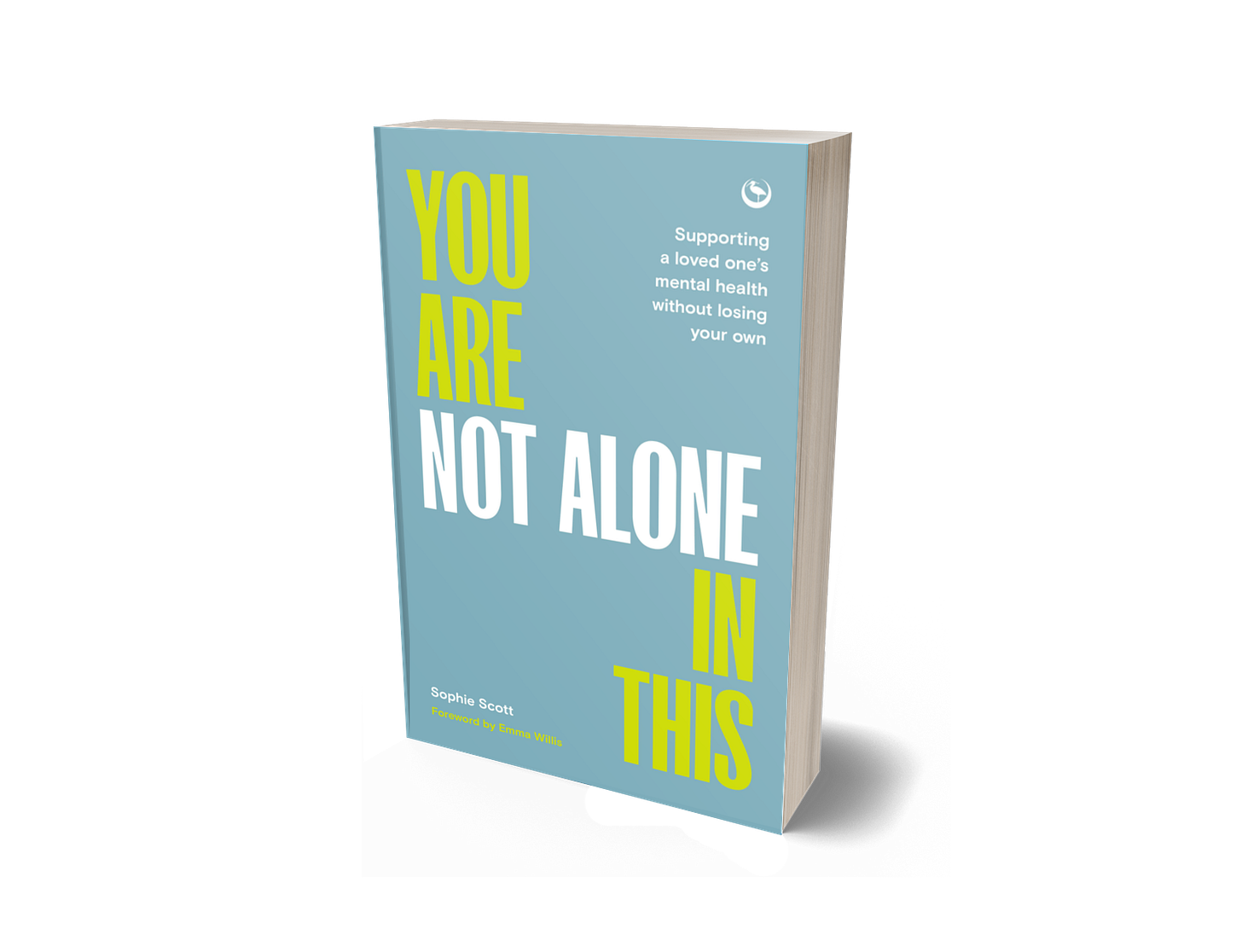I'm excited to share more details about my upcoming debut book. And now, in a style befitting the modesty of the English, a drum roll so subtle it could be mistaken for polite applause at a village cricket match... Presenting its cover!
‘You’re Not Alone In This: Supporting a Loved One’s Mental Health Without Losing Your Own’ is a a project born from my clinical work and own personal experiences. Here's a quick look into its inspiration and why it might be crucial for you, or anyone you know who is supporting a loved one through mental health challenges.
🧠 Over the years in my therapy practice, I’ve seen countless clients who, in their noble effort to support a loved one’s mental health, end up neglecting their own. This is a common and often overlooked reality. After all, if 1 in 4 people suffer with their mental health (a figure I suspect is actually much higher), what about the loved ones who stand beside them, weathering the storm?
The impact on supporters is significant. Statistics reveal that 55% of those in a caregiving role experience depression themselves, and 78% struggle with anxiety. These numbers highlight a profound truth: mental health issues, like all health issues, create a domino effect…
This book is inspired by my observations and further enriched by my own journey - growing up in a family grappling with unspoken mental health issues and, later on, facing my own battles with crippling anxiety. I’ve stood on both sides of this coin: as the supporter and the supported. Through these dual perspectives, I aim to offer insights, tools, and understanding for those walking this delicate and demanding path.
📢 Ask yourself:
“Am I taking on my loved one’s emotional burden at the expense of my own mental health?”
“How can I maintain my own well-being while offering meaningful support?”
“Am I avoiding looking at something in myself by placing all my attention on my loved one?”
💡The revelation: Supporting a loved one with mental health issues should not mean losing yourself. In fact, research on caregiver burnout shows that when you take care of yourself, you're not only protecting your own mental health and preventing burnout - but also becoming a more effective and sustainable source of support for your loved one. Self-care isn’t selfish - it’s the foundation that allows you to show up fully for someone else.
And here’s an important point: you might not think of yourself as a ‘caregiver.’ Maybe you simply love someone who struggles. But love, too, comes with responsibilities, and without boundaries and balance, those responsibilities can take a toll. The truth is, we are all somewhere on the mental health spectrum, and the best way to support someone else is to also care for yourself.
That’s why my book is divided into two halves:
1️⃣ Caring for Your Loved One: Offering practical advice and strategies to help you provide meaningful support, tailored to your loved one's needs/ clinical diagnosis.
2️⃣ Caring for Yourself: Helping you recognize the importance of your own well-being and giving you tools to nurture it, so you can thrive alongside your loved one.
But I go one step further. In the book, I compare relationships to biospheres. Just like these delicate ecosystems, relationships thrive on balance and mutual nourishment - what I call symbiosis. If one part of the system becomes depleted, the entire biosphere struggles to survive. I’ll delve deeper into this idea in next week's newsletter. Stay tuned for a sneak peek at how you can create and sustain that balance in your own life.
🌟 Pre-orders really matter. 🌟
It would honestly mean the world to me if you could pre-order my book here at Waterstones. Pre-orders signal to publishers and bookstores that there’s a demand for this conversation. They help ensure the book reaches more people who need it, so your support has a ripple effect.
Thank you for being part of this journey with me. Together, we can shift the way we think about caregiving, self-care, and mental health - one relationship at a time.
Thanks for being here,






